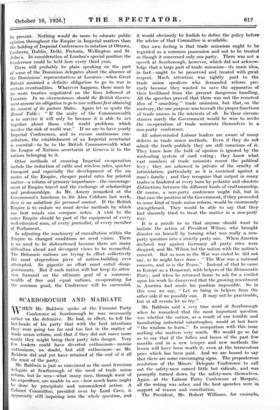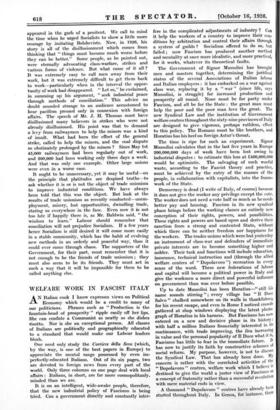SCARBOROUGH AND MARGATE
WHEN Mr. Baldwin spoke at the Unionist Party Conference at Scarborough he was necessarily rather on the defensive. He had, in effect, to tell the hot-heads of his party that with the best intentions they were going too far and too fast in the matter of trade union reform, and that if they did not move more warily they might bring their party into danger. Very few leaders. could have diverted enthusiasm—unwise enthusiasm, no doubt, but still enthusiasm—as Mr. Baldwin did and yet have retained at the end of it all the trust of the party. Mr. Baldwin is just as convinced as the most ferocious delegate at Scarborough of the need of trade union reform, but he sees—what many men, through want of his experitnee, are unable to see—how much harm might be done by 'precipitate and unconsidered action. A Cabinet Committee, presided over by Lord Cave, is apparently still inquiring into the whole question, and it would obviously be foolish to define the policy before the advice of that Committee is available.
Our own feeling is that trade unionism ought to be regarded as a common possession and not to be treated as though it concerned only one party. There was not a speech at Scarborough, however, which did not acknow- ledge that a large part of trade unionism—its main idea, in fact—ought to be preserved and treated with great respect. Much attention was rightly paid to the trade union speakers who demanded reform pre:. cisely because they wanted to save the apparatus of their livelihood from the present dangerous handling, All the speeches proved that there was not the remotest idea of " smashing " trade unionism, but that, on the contrary, the one purpose was to exalt the proper functions of trade unions in the interests of all. In these circum- stances surely the Government would be wise to invite the co-operation of trade unionists themselves in a non-party conference.
All sober-minded Labour leaders are aware of many defects in trade union methods. Even if they do not admit the truth publicly they are still conscious of it. They know how the bulk of opinion is ignored by the misleading system of card voting ; they know what vast numbers of trade unionists resent the political levy ; they are ashamed in 'private of the cruelty of intimidation, particularly as it is exercised against a man's family ; and they recognize that output in many trades is hindered at every turn by pedantic and obsolete distinctions between the different kinds of craftsmanship. Of course, a non-party conference might fail, but in that case the position of the Government, if they proceeded to some kind of trade union reform, would be enormously strengthened. They would be able to say that they had sincerely tried to treat the matter in a non-party way. It is a puzzle to us that anyone should want to imitate the action of President Wilson, who brought disaster on himself by turning what was really a non- party question into a strictly party one. When America declared war against Germany all party cries were dropped, and Mr. Wilson led the nation with the nation's consent. But as soon as the War was ended he did not say, as he might have done : " The War was a national concern, and so is the Peace." Instead of that he came to Europe as a Democrat, with helpers of the Democratic Party, and when he returned home to ask for a verdict upon his work he discovered that the growing resentment in America had made his position impossible. So in this case we say, " Let us bring in helpers from the other side if we possibly can. It may not be practicable, but at all events let us try."
Mr. Baldwin said a very true word at Scarborough when he remarked that the most important question was whether the nation, as a result of our terrible and humiliating industrial catastrophes, would at last have " the wisdom to learn." In comparison with this issue" nothing else matters very much. - We would go so far as to say that if the follies and losses of the past few months end in a new temper and new methods the lesson will have been worth it, even at the treMendous price which has been paid. And we are bound to say that there are some encouraging signs. The preposterous resolution of the Miners' Delegate Conference to call out the safety-men earned little but ridicule, and was promptly turned down, by the safety-men themselves. Again, • at the Labour Party Conference at Margate, all the voting was sober, and the best speeches were in support of reason and conciliation. The •President, Mr. - Robert Williams, for example, appeared in the garb of a penitent. We call to mind the time when he urged Socialists to show a little more courage by imitating Bolshevists. Now, in 1926, his story is all of the disillusionment which comes from thinking that " things must become much worse before they can be better." Some people, as he pointed out, were eternally advocating class-warfare, strikes and various forms of violence. But what came of it all ? It was extremely easy to call men away from their work, but it was extremely difficult to get them back to work—particularly when in the interval the oppor- tunity of work had disappeared. " Let us," he exclaimed, in summing up his argument, " seek industrial peace through methods of conciliation." This advice no doubt sounded strange to an audience accustomed to hear pacifism pressed only in connexion with foreign affairs. The speech of Mr. J. H. Thomas must have disillusioned many believers in strikes who were not already disillusioned. His point was that to demand a levy from railwaymen to help the miners was a kind of insult. What had been the effect of the general strike, called to help the miners, and the coal dispute so obstinately prolonged by the miners ? Since May 1st 45,000 railwaymen had been regularly out of work, and 200,000 had been working only three days a week. And that was only one example. Other large unions were even in a worse case.
It ought to be unnecessary, yet it may be useful—on the principle that platitudes are despised truths—to ask whether it is or is not the object of trade unionism to improve industrial conditions. We have always been told that this was the object. But look at the results of trade unionism as recently conducted—unem- ployment, misery, lost opportunities, dwindling trade, staring us everywhere in the face. Even now it is not too late if happily there is, as Mr. Baldwin said, " the wisdom to learn." Labour should remember that conciliation will not prejudice Socialism. If a few years hence Socialism is still desired it will come more easily in a stable community, which has the habit of evolving new methods in an orderly and peaceful way, than it could ever come through chaos. The supporters of the Government, for their part, must remember that it is not enough to be the friends of trade unionism ; they must also seem to be its friends. They must act in such a way that it will be impossible for them to be called anything else.























































 Previous page
Previous page